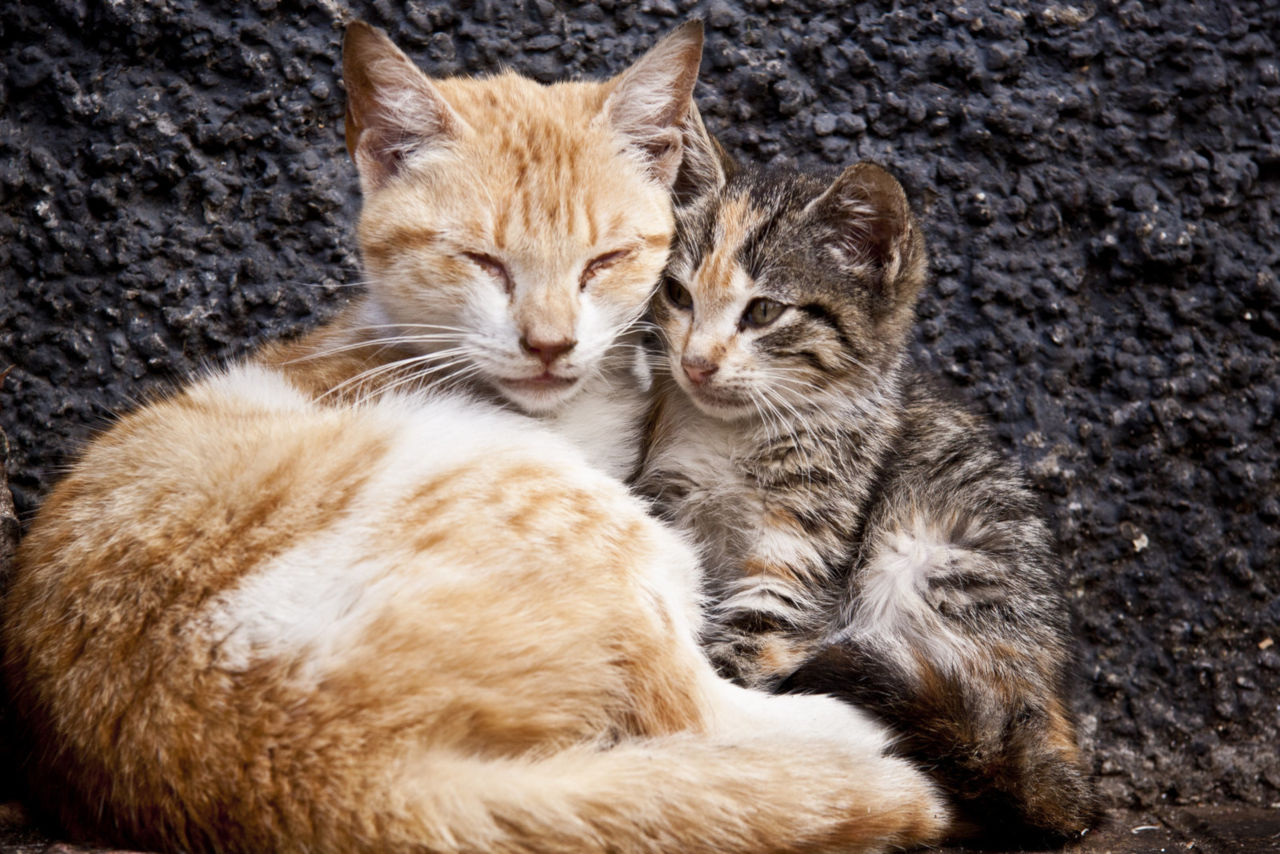Most people think of cats as aloof and distant. They have a reputation for being reclusive and valuing their personal space. Unlike dogs, who are very social and desperate for attention, your cat may be more content to entertain himself. However, this is not true of all cats; some are friendly cuddlers. This raises the question of whether cats are genuinely loners or essentially social animals.
Cats are not essentially loners but social creatures that enjoy company. However, it depends significantly on how they were raised and socialized as kittens. Cats separated from their litter too young may become suspicious of people and other cats. A cat with good experiences with cats and people will become friendlier and more sociable.
This does not mean that cats are naturally as attention-seeking as dogs. They still have their own way of communicating and showing affection.
Even though a cat may seem more aloof than an excited puppy, it still needs love and time to cuddle. Neglect can lead to a lonely cat with neurotic behavior.
Most cats can spend time alone but become restless when they don’t have company.
Are All Cats Loners?
Your cat may ignore you if you try to get its attention. She may not always respond to attempts to play; if you try to pet her, she may run away. This can make cats seem antisocial.
Despite this aloof attitude, however, cats are not loners by nature.
Feral cats that survive on the streets form colonies. These cat colonies consist of mother cats, their children, and close relatives.
Female cats in these colonies help each other raise their kittens, protect them from threats, and fend off intruders.
For cats, groups provide both protection and companionship. For this reason, cohabitation is a common biological instinct. It ensures that cats do not have to fend for themselves and their offspring alone.
Only when resources are scarce is sociability not beneficial. For this reason, sand cats (Felis margarita), a desert-dwelling wild cat species, are solitary animals.
Felis catus, the domesticated cat species that people keep as pets, has no problem forming groups. As long as there is enough food, they actually prefer it.
Do Cats Like to Be Alone?
Most feral cats prefer to hunt alone. Although they spend a lot of time in the colony, they forage on their own once they reach an appropriate age.
Adult cats rarely help each other forage. They are more likely to do this if closely related, but it is not usually a joint activity.
Males also do not play a unique role within the colony. They usually go off on their own to explore. Nevertheless, they can be friendly to females in the colony if they are part of the family.
Therefore, most cats have no problem being alone for extended periods. However, they will almost always return to the group at some point.
It is the cat’s nature to have and maintain a social network. Even though cats value their privacy for certain things, they do not want to be alone permanently.
Are Cats Friendly to Other Cats?
Cats are generally friendly to other cats. However, this depends significantly on how the cat was raised and socialized.
Kittens learn to behave correctly toward other cats between 2 and 14 weeks of age.
During this time, they play with other kittens and learn to control the force behind their bites and scratches. They also learn various body language signals from their mother.
Kittens deprived of these lessons grow up to be highly wary cats. They are instinctively wary because they don’t know how to respond to body language appropriately. They were never taught that.
When encountering another cat, poorly socialized adult cats often exhibit unpredictable, territorial, aggressive, or fearful behavior.
However, getting a poorly socialized adult cat to trust other cats is possible. However, this process is lengthy and exhausting for both the cat and the owner.
Poorly socialized adult cats tend not to like company. It is best to respect this wish and not make them interact with other cats.
Are Cats Friendly With People?
Some believe that cats dislike interacting with people and prefer to stay alone.
Other theories state that cats only see their owners as food and shelter providers. However, this is not the case.
Instead, cats love to spend time with people. In a scientific study, domestic cats and cats from shelters were exposed to four different stimuli:
- Human interaction
- Food
- Scents
- Toys
The researchers found that the cats preferred human interaction over the other three stimuli.
Believe it or not, both domestic and shelter cats preferred human contact over food.
Despite this study, many owners have different experiences with their cats. This is usually due to the following reasons.
No Neutering
Unneutered cats tend to become more aggressive once they reach sexual maturity. This happens between the ages of 6 and 18 months.
During this time, your cat may become unpredictable in search of another cat to mate with.
Male cats then become territorial. They may even attack you if you get too close to a female cat they are trying to mate with.
Female cats are usually less aggressive when they are in heat, but they can act out in the same way.
Socialization
The first 2-14 weeks are not only crucial for learning how to behave toward other cats.
The social interaction the kitten experiences with people during this time will shape his behavior for the rest of his life.
If the kitten has healthy interactions with people, it will be more sociable when it becomes an adult cat.
Personality
All cats are different, and it is said that cats have five basic character types. Depending on which type your cat has, it may or may not be friendly towards you.
Domestic cats like company and are very sociable. However, some cats spend more time with themselves than others.
Bad Experiences
Your cat’s history can explain its behavior. Cats that have been mistreated in the past carry trauma that affects their interaction with the environment.
Even if they love you and feel safe around you, their bad experiences may cause them to be overly aggressive, territorial, or even a little paranoid.
Motherhood
The behavior of female cats that are pregnant often changes. The female cat is more aggressive and protective of her litter in the first month after giving birth.
Are Female Cats Less Social?
It is a common misconception that female cats are less social than males.
There are theories that cats with tortoiseshell patterns are more aggressive than other cats.
To get the three coat colors, two X chromosomes are required. This means that cats with tortoiseshell patterns are predominantly female.
Feral colonies, however, often consist of mother cats and their children. The mothers in the colony help each other raise their kittens and protect the colony from threats and intruders while the litter grows.
These intruders are usually male cats that want to mate. This teamwork would not be possible if the females did not get along.
A cat’s behavior has less to do with its sex and more with how it was socialized as a kitten. Cats are highly impressionable during the first few weeks of their lives.
The environment they grow up in during those first few weeks shapes their behavior when interacting with others for the rest of their lives.
Often, these behaviors cannot be changed. A female is likely to retain this trait if she has been raised to be social.
If she learned to distrust others, she will likely remember it.
Are Male Cats Less Social?
Many male cats are not a part of a cat colony. Some suggest this is because they are less social and prefer to be alone. However, this is not true.
Cats become adults between 6 and 18 months of age. Once adults, males wander away from their homes, searching for female cats to mate with.
Their mating needs often take them far away, and they may be away from the colony for weeks.
Cats leave scent marks to greet and recognize each other. How well two cats remember each other depends on how much time they spend together as kittens.
For example, imagine a male cat who is six months old and has left his family for a few weeks.
When he returns, his family may not recognize him and treat him like an intruder.
For this reason, males are rarely part of colonies. The cats remember some males when they return to the colony and maintain a friendly relationship with the matriarchs.
However, this tends to be the exception, not the rule.
Do Cats Feel Lonely Alone?
Some cats feel lonely alone, but others enjoy time to themselves.
Cats can form close bonds with people. They have different attachment styles; some become visibly anxious when their owner is not around.
But of course, this depends on your cat’s personality.
Most cats can handle being alone for extended periods. Although they have a bond with you, they don’t go crazy without you.
Other cats have separation anxiety. They may become destructive or depressed when separated from their owners.
It would be best to observe your cat’s behavior before leaving them alone and after. This will tell you if she has become lonely.
Common signs of loneliness in cats are:
- Excessive meowing
- Excessive grooming
- Peeing or defecating outside the litter box.
- Lethargy
- Excessive sleeping
- Destructive behavior when you are not around.
- Aggression toward you or other cats
Is It Wrong to Keep Only One Cat?
While it is true that cats can become lonely and depressed, it is not cruel to keep only one cat.
Cats sometimes show signs of loneliness when their owners leave home, but this loneliness rarely lasts long.
Cats that do not suffer from separation anxiety have no problem being alone for long periods. They will entertain themselves as long as they are provided with everything they need.
For cats that suffer from separation anxiety, the loneliness turns into boredom after a while. For this reason, neurotic cats lash out and exhibit numerous behavioral problems when left alone.
However, if this applies to your cat, a feline companion is not always the solution. Depending on the severity of the behavioral problems, your anxious cat may be too nervous to enjoy the company of another cat.
The best way to address the behavior is through training. As it is, the cat is too dependent on you to have healthy social behavior.
How Can I Make My Cat More Social?
It would help if you gave it more attention to make a reticent cat more approachable.
Cats are more willing to engage with people who pay attention to them than those who ignore them.
Some proven ideas to build a relationship with a cat include:
- Playing with the cat
- Teaching her tricks
- Petting her
- Offering her food
- Sleeping next to the cat
However, letting the cat determine these social activities would be best. Cats respond better to interactions when they initiate them themselves.
It will make the experience more positive if you allow them to take the lead.
Conclusion: Are Cats Solitary Creatures?
Cats are social creatures and are not loners by nature. They should enjoy the company as long as they have grown up with other cats and people.
True loners are often mistreated as kittens, poorly socialized, or rejected by other cats.


